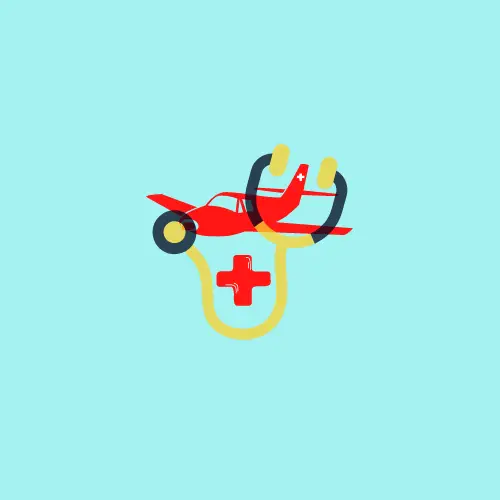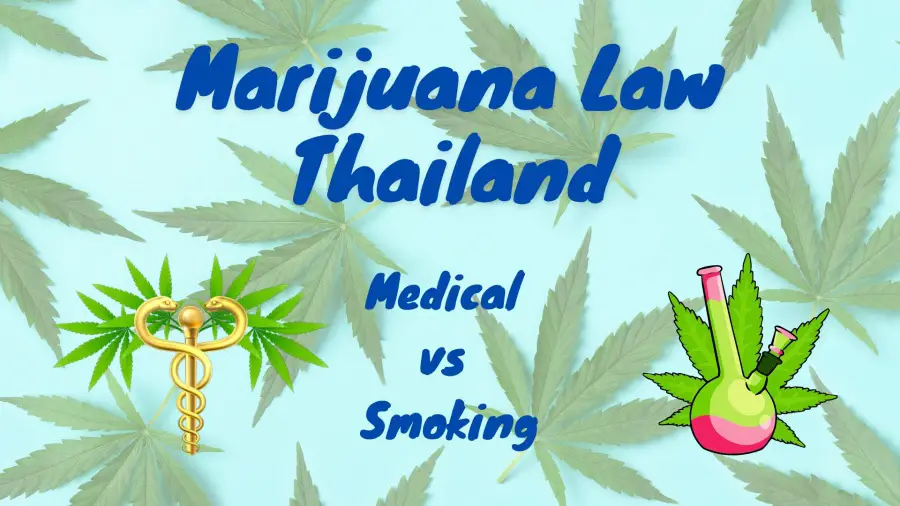What is the Marijuana Law in Thailand? This is a complex issue that is still changing. When a guy offers you a joint at a party, it’s important to remember that smoking in public is still illegal.
Clarity is expected by the end of 2024, however, this is Thailand and many parties are interested in marijuana. With the change in government things are back up in the air. We will update this post as soon as new information is available.
People caught smoking in public can be fined up to 25,000 baht ($723) and sentenced to up to three months in prison. So, the act of smoking weed in public is still PUNISHABLE.
Although Thailand has recently released 3,000 prisoners convicted of cannabis offenses and is planning to release more, the actual law does not allow for recreational use of any part of the marijuana plant.
In spite of politicians claiming these restrictions exist, it appears that little to no efforts will be made to control what people can grow and smoke at home, aside from registering with the government and declaring it to be medically necessary. The clarification released on August 17th stated that:
- every household may grow up to 15 plants, provided they have registered with the government.
- online sale of cannabis is illegal
- vending of cannabis is illegal
- advertising for the sale of cannabis is illegal
- For the growing of Hemp – up to 5 rai per household (1.98 acres)
You Can Grow It but Can’t Smoke It! – see Part 1 of this article here.
On 14 and 15 June 2022, the previous article was amended to clarify that recreational use is discouraged, rather than forbidden, and to remove a statement that only low potency cannabis may be used.
Things are changing rapidly, as of August 17th, individuals will be able to grow 15 plants per household, (previously only 3 plants were allowed). A permit is also required for anyone cultivating plants for commercial purposes. Growers must inform the authorities.
Hemp crops will be allowed up to 5 rai per household.
Commercial hemp operations must be limited to Thai nationals over 20 years of age.
One million cannabis seedlings have been distributed across the country in an effort to encourage interested growers.
Supporting Economic Growth Is the Goal
Food and drinks laced with cannabis are increasingly available in cafes and restaurants. As foreign tourists return slowly after the pandemic, such businesses hope to attract their business.
Parliament is currently debating a new draft law on cannabis control, which includes details on its commercial use and production.
Can You Be Punished for Smoking or Growing Without Permission?
Nobody is certain whether the following legal guidelines will be amended or enforced, but they still apply until the next guidelines issued by the government:
- Producing, importing, or exporting marijuana can lead to 2-15 years in prison and a fine of 200,000 – 1,500,000 Baht.
- Two to ten years in prison or a fine of 40,000 to 200,000 Baht or both for disposal or possession for disposal
- When the quantity is over 10 kilograms, the penalty is increased to a maximum of 15 years and a fine of 200,000 – 1,500,000 Baht is imposed
- If convicted of possession, you will serve a maximum of five years in prison and be fined not more than 100,000 Baht or both.
- The penalty for consumption is one year in prison and a fine between 100,000 and one million dollars.
Other rules included banning cannabis in schools, requiring retailers to provide clear information on using cannabis in food and drinks, and making marijuana smoke a public nuisance punishable by jail time and fines.
Law Emphasizes Medicinal Use
The best summary I can find about Thailand’s efforts to decriminalize Marijuana can be found on Wikipedia.

The medical benefits of cannabis have led to its legalization in Thailand. Several conditions or diseases have been approved for medical marijuana according to Thailand’s legislature, including HIV/AIDS, Crohn’s Disease, Cancer, Multiple Sclerosis, Post Traumatic Stress Disorder, Tourette’s Syndrome, Rheumatism, Migraines, Inflammation, Epilepsy, Alzheimer’s Disease, Lupus, Obesity, ODC/ADHD, Parkinson’s disease, Stroke, and Schizophrenia.
Can we say it is legal? The decriminalization of cannabis is strictly medical, so yes, it is legal now in Thailand. However, Cannabis with a high THC content cannot be consumed for recreational purposes. So, locals and tourists who smoke ganja openly may still face jail time. In reality, many cannabis cafes and bud shops offer “smoking rooms” to keep you off the streets and away from the long arm of the law.
Government approval and registration are required for most cannabis in the country. Decriminalizing cannabis brings Thailand closer to complete legalization for all purposes. However, the road ahead is still very long. On August 17th, 2022, the Minister for public health, Anutin Charnvirakul offered clarification on the law.
Role of Narcotics Control Board
The Narcotics Control Board and the Ministry of Public Health reached a unanimous decision on this issue. The purpose of this piece is to answer the question, “Is weed legal in Thailand?” and what are the latest updates for marijuana in the country?
The narcotic bill contains 5 categories
Categories of Narcotics
Among the five categories of narcotics listed in Section 29 of the Narcotics Code, there are:
- Heroin and other dangerous narcotics fall under category 1.
- Ordinary narcotics such as morphine, cocaine, codeine, and medicinal opium fall into category 2.
- According to the rules prescribed by the Minister of Public Health under the recommendations of the Narcotics Control Committee, category 3 narcotics consist of medicinal formulas containing narcotics of category 2.
- Among the chemicals in category 4 are those used to produce narcotics in category 1 or 4, such as Acetic Anhydride.
- Category 5 includes narcotics other than those in categories 1 – 4, such as opium.
Permission
Thai law prohibits the manufacture, import, export, sale, possession, and use of narcotics unless permission has been obtained. Under the rules, procedures, and conditions prescribed in the ministerial regulation, any party seeking to conduct the foregoing may apply to the Minister of Public Health, the Secretary-General of the Food and Drug Administration, or the person appointed by the latter. It is permissible to obtain permission for educational, medical, scientific, and industrial purposes. For certain professions, including medical, dental, government agencies, and the Red-Cross Society of Thailand, it may be possible to manufacture, import, export, sell or possess narcotics without permission, provided the Minister of Public Health prescribes the rules, procedures, and conditions under the supervision of the Narcotics Control Committee. In addition, patients prescribed certain narcotics for the treatment of an illness are exempt from obtaining permission to possess them in a limited and specified amount.
Conclusion
In Asia, Thailand is the first country to decriminalize marijuana, paving the way for future developments. However, it comes with certain restrictions.
3 Key Points to consider:
- Following the decriminalization of cannabis, businesses began openly selling marijuana
- Cannabis is now legal in Thailand for medical use and health purposes, according to health minister Anutin Charnvirakul
- Smoking weed in public is still an offensive act that is punishable in Thailand
There have been challenges to the legality of marijuana in Thailand for decades. The Thai government changed its laws in 2020, allowing medical cannabis to be used for chronic or medicinal purposes.
Many new bills will be passed to make weed more accessible to medical patients, foreigners, and food and beverage workers, even though recreational use of weed in public is still prohibited.



